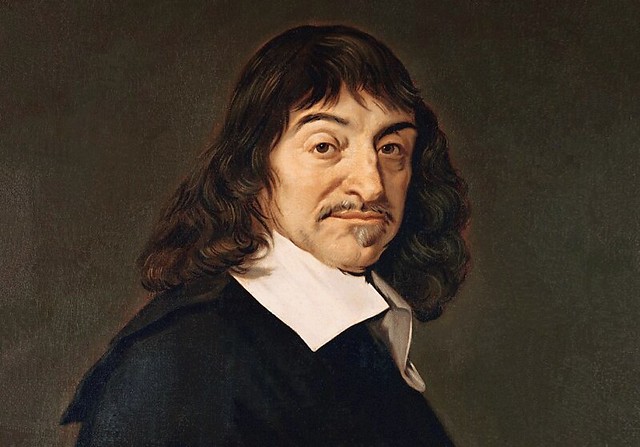Before I share this, I just want to say that I do not have a Philosophy major, nor do I think I am reinventing the wheel. Nevertheless, here’s some thoughts I have. Make of them what you will.
March 4, 2021
Just finished reading about René Descartes, from a book <REDACTED> lent me. I was excited to learn more about Mr. ‘I think, therefore I am’, largely because another book – placing more emphasis on the emotional side of learning – suggested that Descartes had actually just given voice to our most fundamental misunderstanding; believing we are our thoughts, rather than our feelings. But now I’m wondering, what if we are both?

Descartes didn’t actually make a philosophical argument with his cogito ergo sum statement – rather, it was ‘a simple intuition of the mind’, according to him. His original (and more popular) statement was changed later to ‘I am; I exist.’ But where do our intuitions come from?
My belief is that they arise from the felt senses, which would mean it was feeling, rather than thinking, which led Descartes to that conclusion. But later in the chapter, supporting arguments are brought to bear that indicate that, had he actually structured his statement as an argument, it would still have been accurate through pure reasoning:
A. I am capable of thought.
B. All beings capable of thought exist.
C. I think, therefore I am.
The idea is that ‘I’ (the being who is organizing the thoughts), am able to contemplate my reality, and even if I could be convinced that I cannot ultimately know anything else to be true, I know that the consciousness that gives rise to the thoughts must exist, or the thoughts could not have arisen in the first place. But what if we could substitute ‘felt senses/emotions’ for thought/thinking? Would the statement still be true?
Just as Descartes ‘intuitively’ felt his existence, so too can we sense that emotions, as well as thoughts, arise from a single point that is our awareness.
Admittedly emotions can seem more distant at times, because they manifest in the body, while our seat of consciousness generally seems to be between our ears, but science strongly suggests that these manifestations are a product of another kind of thinking, done by our subconscious.
Our subconscious must also play a role in our existence, for it works with our conscious mind to produce the ‘intuitions’ that tell us how close to truth we are.

Put another way: Any conclusion we come up with, has other conclusions that could be drawn from the same premises, excepting those premises that were man-made constructs to begin with.
Pythagoras’s Triangle, for example, only works if the triangle is a perfect triangle, with no curves or other flat surfaces too small for us to detect. As every triangle in nature has these imperfections if we zoom in close enough, the theorem that arises – while being a good approximation for most uses – is not the ultimate Truth, because it never conforms perfectly to reality.
Descartes argument for existence is even easier to question, because we could just as easily conclude that our thoughts are being ‘delivered’ to us from elsewhere, and we are simply experiencing them. Many spiritual leaders have also come to the conclusion that we are not our (conscious) thoughts, but a point of awareness that observes all else.
If we can always draw multiple conclusions from the information at hand, the ‘truth’ we decide on may have more to do with the person making it than how ‘true’ it actually is. But some truths feel closer to the Truth than others.
Our subconscious, which delivers these intuitions, processes far more information than our conscious brains do, and thus can provide more accurate answers – or at least answers that are accurate in more situations – than those derived from our consciousness alone. In doing so, it can be said that it brings us closer to Truth, although it too eventually runs into limitations.
The trick is, were we to have conscious access to all that information, it would overload our neocortex and probably put us in a catatonic state. So our subconscious informs us indirectly – through body sensations – and these subtle feelings create a sense of ‘rightness’ or ‘wrongness’, which seems to come from the conscious mind directly.
That is not to say that our felt senses cannot be biased as well, which is why I believe the two work together to produce our sense of existence. Our consciousness is sharp, precise. It allows for careful and detailed examination and well-measured conclusions. Its drawback is it has limited information it can hold on to at one time.

The subconscious is diffuse, but stores a much higher proportion of our sensory experience. It lacks the precision of our consciousness, but points us in directions we would otherwise never have conceived. Its drawback is that it can become easily biased by trauma, resulting in ‘intuitions’ that are really just elaborate self-protective mechanisms.
Working together, the conscious mind is needed to interpret the subconscious and weed out the trauma-based patterns that hinder true intuition. And the subconscious helps point the sharper consciousness in the direction of Truth. Together then, the two parts guide us to see ever more deeply into ourselves, and the nature of reality.
Coming back around to Descartes, his original ‘I think, therefore I am’ might still be accurate – but more so if we consider that thinking encompasses both the rational, conscious mind, and the emotional, subconscious one.
Credits:
‘Boy Standing Near Bookshelf’ by Pixabay from Pexels
‘Halloween Candy Inside a Skull’ by cottonbro from Pexels
‘Rene Descartes’ by Franz Hals on Flickr
‘Woman in Grey Sweater Holding Gold iPhone 6’ by airfocus from Unsplash

